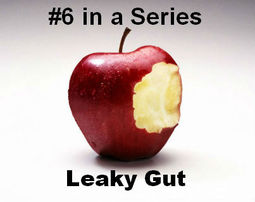
In the small intestine, there are many villi and microvilli. They look like tiny hairy protrusions extending from the lining.
These villi and microvilli (also called brush border) create a much larger surface area for the purpose of absorption, and the cells are linked closely together forming tight junctions.
See this short video of the villi in the small intestine.
When the gastrointestinal tract is inflamed or irritated, these junctions will loosen up, allowing for larger molecules to pass through. It can even be a good substance, such as broccoli, but when broccoli is not broken down into the tiniest of particles for digestion, and the junctions are loose, allowing for larger molecules to penetrate, then broccoli is seen as a foreign substance. When these large substances are able to pass through the intestinal lining, they enter the blood stream and an antibody response is created by our immune system, alerting our white blood cells to spring to action. Once this battle is taking place in the blood stream, then inflammation and disease can show up any where in the body. It can become rheumatoid arthritis, for example. And to add to this trouble, a person can become malnourished over time, if inflammation continues in the GI lining, preventing even the good nutrients from entering.
So the term "leaky gut" pretty much describes the situation. Here's a good example: When I brew coffee, I use a filter to catch the grinds. If I use a food colander with bigger holes, the grinds will go through, and I do not like to drink coffee grinds. It's the same way with "leaky gut." Large particles are penetrating the intestinal lining and entering the blood stream. Another name for leaky gut is increased intestinal permeability.
Of surprise to me, I learned that surgery and tube feeding in the hospital can also create a similar condition to Leaky Gut, since bacteria can get through the blood stream.
Leaky Gut has been associated with the following problems: allergies, celiac disease, Cohn’s disease, HIV, and mal-absorption syndromes. It is also linked to autoimmune disease such as AIDS, ankylosing spondylitis (chronic inflammatory disease of the spine), asthma, atopy, autism, bronchitis, eczema, food and environmental sensitivities, other allergic disorders, psoriasis, Reiter’s syndrome, rheumatoid arthritis, Sjogren’s syndrome, and skin irritations.
Leaky Gut has no single cause but may be attributed to chronic stress, poor food choices, alcohol, NSAIDs (aspirin, Advil, Motrin, etc.), food sensitivities, poisons in the environment, candida, or chemotherapy drugs.
Now that we have all found ourselves in one or more of the previous listed problems, what can we do about it?
My heart's desire is to help others with their health problems. Hopefully upon graduation from school, I will be able to begin to direct someone in the right path. Most textbooks say to work with your health professional for treatment; maybe I will be that person soon.
To repair Leaky Gut, try the 4 R approach:
- Remove the cause
- Replace with beneficial enzymes and nutrients
- Reinoculate with beneficial bacteria (probiotics and prebiotics)
- Repair the intestinal wall
Remove: Take a look at what may be the cause of "leaky gut." What kind of food choices do you make? Are you eating a diet of whole foods, or is it mostly refined or processed foods? Try to eat organic if possible to avoid toxins in foods. Are you under stress? The body will gear up for emergencies or possible danger (fight or flight), but did you know that stress from meeting deadlines, or working with an impossible co-worker, will also put the body in the same kind of stress. Stress is something we must all deal with. Exercise can be a stress reliever, but it can also be a stress inducer if the body is pushed too hard. Remember that it is not so much that we are under stress, but how we respond to it that matters most. If you think you have food sensitivities or allergies, then eliminate certain foods from the diet and see how your body reacts after reintroduction of the foods after 3 or 4 weeks. if your body reacts in a bad way, then you probably do have a sensitivity or allergy to it.
Replace: Use digestive enzymes or bitters with meals to help digest the food. In between meals take proteolytic enzymes to help immune fuction. Try mucilaginous herbs such as slippery elm (can be in tea form), fenugreek, peppermint and marshmallow (tea form). Flaxseeds are very mucilaginous. They can be ground in a coffee grinder and added to foods or just soak them in water for several hours and drink as is. I grind 2 tablespoons every morning and add a small amount of organic unsweetened applesauce, a little unsweetened almond milk, and a little liquid stevia if more sweet taste is preferred. Supportive foods include: cabbage juice, bone and vegetable broths, fresh vegetable juices (not storebought since pasteurization kills the enzymes). Focus on eating a whole foods diet.
Reinoculate: Fermented foods and probiotic supplements
Repair: Aloe vera juice is very soothing and cooling. It promotes cell regeneration and repair. Glutamine is alkalizing to the body and is indicated by many health professionals as the top repair supplement. The cells of the small intestine depend on glutamine as their main fuel for maintenance and repair. Start with 1-30 grams daily and keep watch. Too much can constipate, so you want to find your range and take that daily. Quercetin (Perque Pain Guard brand or Repair Guard brand) - 500 - 3,000 mg daily. Quercetin can help with allergies as it prevents histamine release.
There are other supplements. If interested, contact me.
For other posts in this series see About Nutrition
Sources:
Total Body Tune-up by Michael Murray
Digestive Wellness by Liz Lipski
Hawthorn University NC-3 Lectures

